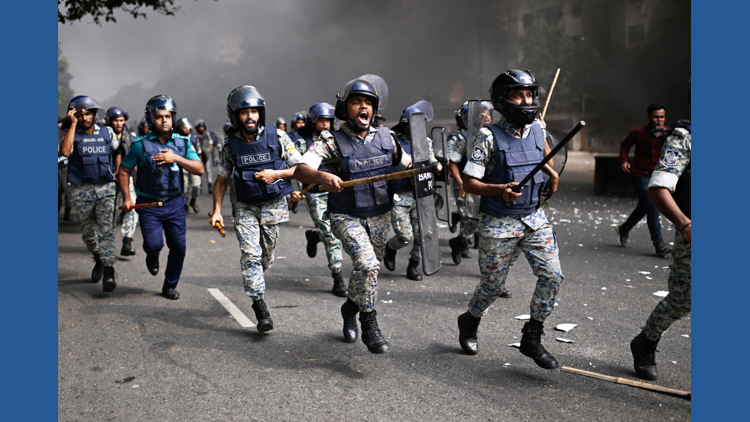UPDATE: The son of ousted Bangladeshi Prime Minister Sheikh Hasina has urgently called for the immediate lifting of a ban on his mother’s party, warning that an election without the Awami League would be a “sham.” In a revealing interview with The Associated Press on Wednesday, Sajeeb Wazed Joy stated that Bangladesh’s political stability hinges on an inclusive electoral process under the current interim government led by Nobel Peace Prize laureate Muhammad Yunus.
Joy emphasized that without the participation of the Awami League in the upcoming elections, scheduled for February 2026, the country will continue to face intense political instability. “This ban has to be lifted; the elections have to be inclusive and free and fair,” he asserted from Washington D.C. “What is happening now is political manipulation disguised as justice,” he added, highlighting concerns over government actions aimed at preventing his mother and other political leaders from participating in the electoral process.
The political landscape in Bangladesh has dramatically shifted since the ousting of Hasina last year, which ended her 15-year rule and forced her into exile in India. Following her removal, Yunus’s government imposed a ban on Awami League activities and arrested many senior leaders. Joy expressed alarm over these actions, stating, “If the Awami League party is not given enough time to prepare for the election the results will not be recognized by the people of the country or by international observers.”
International rights groups, including Human Rights Watch, recently urged Yunus to end the “broad ban” on the Awami League, arguing it excessively restricts fundamental freedoms and has led to numerous arrests of party members involved in peaceful activities. Joy pointed out that the interim government has not allowed any election preparations for his party, raising doubts about the legitimacy of the upcoming elections.
Bangladesh’s political situation is further complicated by a fragmented landscape, with Khaleda Zia‘s Bangladesh Nationalist Party emerging as a significant competitor. The Jatiya Party, another major political entity, faces severe restrictions, including attacks on its headquarters and thwarted rallies. Additionally, the Islamist party Jamaat-e-Islami has gained traction, complicating the political dynamics.
Joy warned that if the current instability continues, Islamist groups may gain power, a concern he attributes to Yunus’s alleged support for these factions. He condemned the government for preparing a “rigged election” and accused it of launching a witch-hunt against Hasina and her family, who face numerous serious charges.
In a somber assessment, Joy acknowledged the tragic loss of life during the recent political upheaval, although he disputed a UN report claiming that up to 1,400 deaths occurred, citing a lower figure of 800 as stated by a health adviser under Yunus’s administration. He called for thorough investigations into these events but criticized the government’s decision to grant immunity to protesters involved in the violence.
The humanitarian impact of the current regime is alarming, Joy reported, with tens of thousands of Awami League supporters jailed without bail, facing severe charges. He claimed around 500 Awami League activists have been killed since the uprising, many at the hands of mob violence, with 31 dying in custody. “The human rights record of this regime is brutal,” Joy stated, noting that minority communities, particularly Hindus, are increasingly targeted.
As the date for the elections approaches, the urgency for an inclusive political framework grows. Joy’s calls to action resonate deeply within a nation grappling with a turbulent past and uncertain future. The international community watches closely, as Bangladesh’s next steps could significantly impact the region’s stability and democratic integrity.
The interim government has yet to respond to Joy’s allegations and calls for electoral inclusivity. All eyes will be on Bangladesh as it navigates this critical juncture in its political history.







